Miss Universe's secret. She was born a man. So why did Donald Trump come to her rescue?
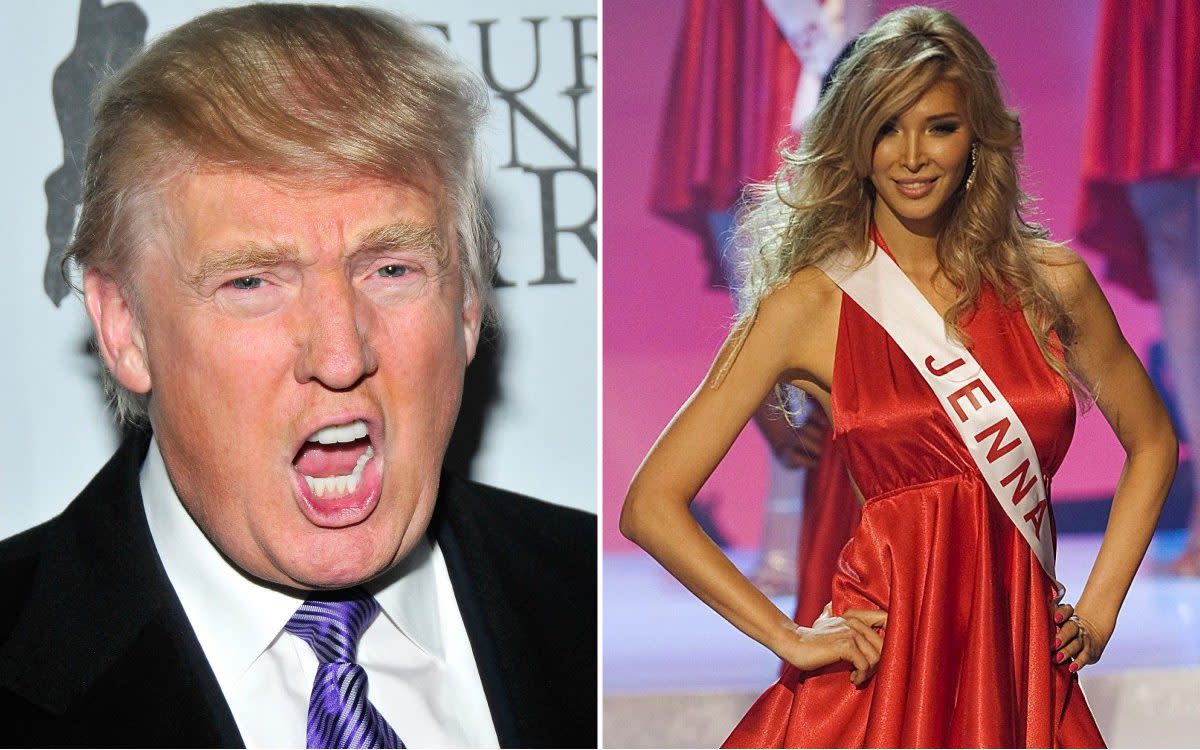
- Oops!Something went wrong.Please try again later.
- Oops!Something went wrong.Please try again later.
- Oops!Something went wrong.Please try again later.
It was 2012 when Jenna Talackova was thrown out of Miss Universe for hiding a secret: she had been born a man. But then Donald Trump came to her rescue…
At the time, the 45th president was the co-owner of Miss Universe – and he wanted to take on her cause. “It’s a big, big story,” he said, of Talackova’s attempt to participate in the Canadian heat of his beauty pageant.
In many ways his statement in her defence looks and sounds like any old video from the desk of Donald J Trump. There the future ex-prez sits, speaking to camera in Trump Tower – hair, skin, teeth, tie and shirt all somewhere between ivory and aureate – bloviating on the topics of the day with a syntax and gesticulation we’re all now familiar with.
“The story about the contestant who wanted to become Miss Universe by going through Canada, very interesting,” he says. “We let her in, let’s see what happens, maybe she’ll do well, maybe she won’t... It’ll be very interesting to see what happens. If for some reason she should win, well, then she has to win the Miss Universe contest.”
After a mild internet storm (this was 2012, everything was milder), Talackova, who underwent gender reassignment surgery when she was 19, found fearless support in the shape of Gloria Allred, the high-profile lawyer who has spent decades advocating for women’s causes – usually winning.
“It isn’t just about her being able to compete,” Allred said at the time. “Jenna is standing up for others as well as herself. She doesn’t want this type of discrimination to be faced by anyone else.”
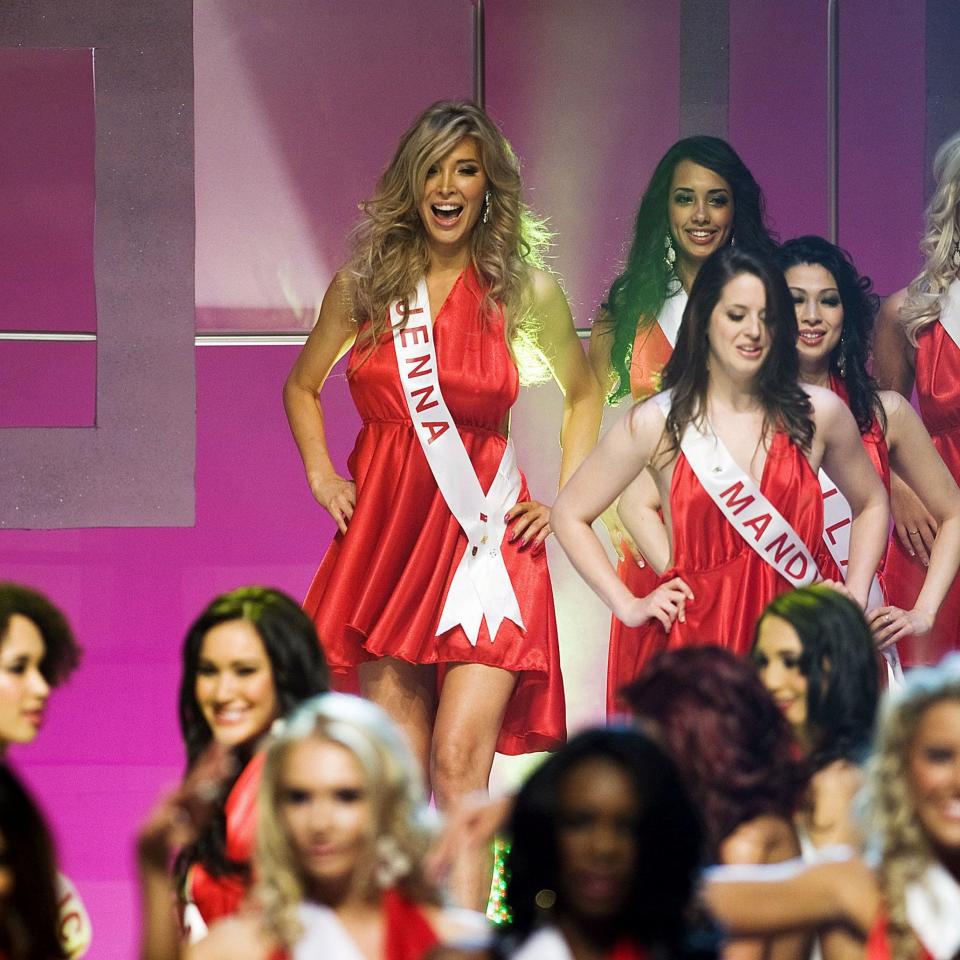
Trump, to the surprise of all those who hadn’t considered him an LGBTQIA+ ally, ordered a change in the rules. Miss Universe would, henceforth, allow transgender contestants. And, should Talackova win in Canada, she would qualify for the organisation’s flagship global competition. “Nobody is capitulating,” Trump’s then lawyer, Michael Cohen, insisted. “Talackova, like all the other contestants, is wished the best of luck by Mr Trump.”
More than a decade later, the tale of Jenna Talackova has become an awkward one for Trump as he plans another assault on the White House. This week, news outlets around the world have carried the story of Rikkie Valerie Kolle, a 22-year-old who has become the first transgender woman to win Miss Netherlands, meaning she will go on to represent her country at Miss Universe in December.
While some have celebrated her victory as a triumph for transgender rights and visibility, others have wondered how Miss Universe allows contestants who are born male to enter. It is just the kind of question Trump might ask at his next rally, given his rhetoric on gender so far this year. “We’re going to defeat the cult of gender ideology and reaffirm that God created two genders – called men and women,” he brayed to a crowd in South Carolina in January. Only, of course, he wouldn’t, because he knows precisely why the rules of Miss Universe are the way they are.
In fact, some have argued that Trump took trans rights mainstream, as his political rivals have realised lately. Last month, a Ron DeSantis supporter Twitter account posted a video portraying Trump as a trans-rights icon. It was set to club music and showed the former President shaking hands with Caitlyn Jenner, who transitioned, saying she could use whichever gender bathroom she liked in Trump Tower. Clips of him speaking about supporting trans women in Miss Universe are included, too.
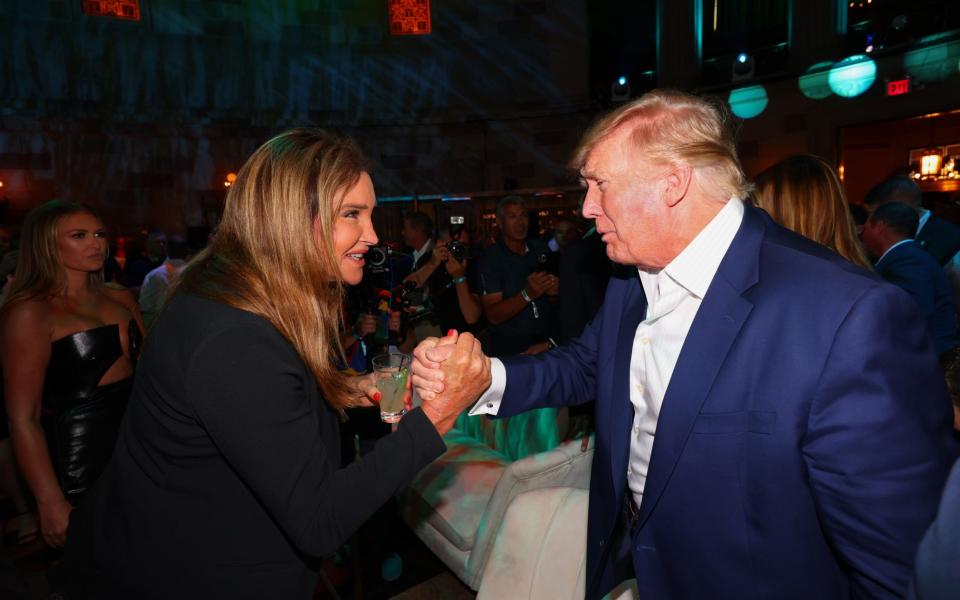
Others have called him “a transgender trailblazer” for allowing Talackova to compete. It is a marked contrast with his record in office, where he backed the appointment of anti-LGBTQ judges, advocated making it legal to fire people for being gay or transgender, and banned transgender people from serving in the military, among other policies.
Kolle and Talackova are not the only transgender women to have benefited from Trump’s rare moment of moral largesse. In 2018, trans model Angela Ponce won Miss Spain, and subsequently took part in Miss Universe in El Salvador later that year. At the time, though, discussion about transgender women in female-only spaces wasn’t the hot-button electoral issue it is now.
Trump, who was US president, hadn’t yet called it “transgender insanity”, as he did this year. “It’s amazing how strongly people feel about that. I talk about cutting taxes, people go like that,” he told an audience last month, miming a lukewarm response. “I talk about transgender, everybody goes crazy. Five years ago you didn’t know what the hell it was.”
Away from politics, in the beauty pageant world, drama is part of the job. “It’s been said that if there’s ever a year without a scandal, pageants will have become boring,” says Sally-Ann Fawcett, a former beauty pageant contestant turned judge, as well as the author of the Misdemeanour trilogy about the history of such competitions. “The articles about [Kolle] will generate so much publicity, and cause so much debate. It’s all good for the competition.”
Fawcett has followed the world of beauty pageants for decades, including competing in British contests in the 1980s. She has just returned from judging Miss Surrey. The winner was “a single mum, not your classic size 8, but she had such a lovely relatable presence on stage.”
She laughs at the idea that pageants have only just become political, noting that barely a year goes by without “Miss Turkey getting in trouble for being photographed with Miss Israel, or protest signs being held up, or accusations of it being rigged for political gains.”
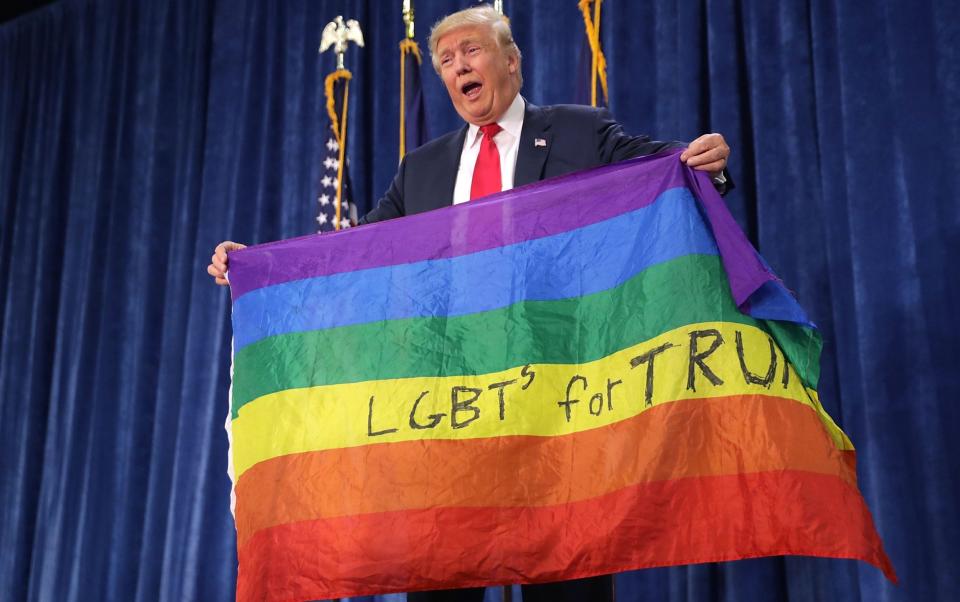
It’s a history that dates back to Miss World in 1970, when, under pressure from anti-apartheid groups, the committee allowed two contestants from South Africa – a white woman representing South Africa, and a black woman representing “Africa South”.
“I used to be very traditional and thought only natural-born women should compete,” Fawcett says. “But I’ve changed and think we need to welcome transgender women. We get plus-size women, wheelchair-users, we have older categories… I think if we want to enable pageants to grow, we have to allow them to change with the times.”
It is different, she points out, to the conversation around sports. “If anything, transgender women have a physical disadvantage, because as a judge you’re studying them so closely. And it’s not just about looks. The interview is about 60 per cent of the score.” Kolle, she says, “looks fine to me, it’s not like you’d say she only won because of her story… Though in this case I suspect she probably did win because of her story.”
It’s not known how much the Trump campaign rue his temporary progressivism in 2012 (Fox News asked if he regretted changing the rules in April, but received no reply), though we do know that he greatly enjoyed owning Miss Universe. He purchased the company in 1996 for an undisclosed sum. “How could I pass up the opportunity to own the world’s premiere beauty pageant?” he later wrote.
In a way, he made pageants great again. “Trump is a divisive figure in [our] world,” Fawcett says. “When he bought Miss Universe, he saved it from the doldrums and put it back on TV, so we have a lot to be grateful for. On the other hand, he was a sleazy old man who used to burst into the changing rooms and insist on having a hand in picking the winners.” She pauses. “But I think he did great things.”
Both reviews can be true. After a lull in the 80s and 90s, Trump did return beauty pageants to glitz and glamour, but after he was forced to sell his stake in 2015, when comments about Mexican immigrants repelled advertisers and broadcasters, former contestants made alarming allegations about his behaviour as proprietor.
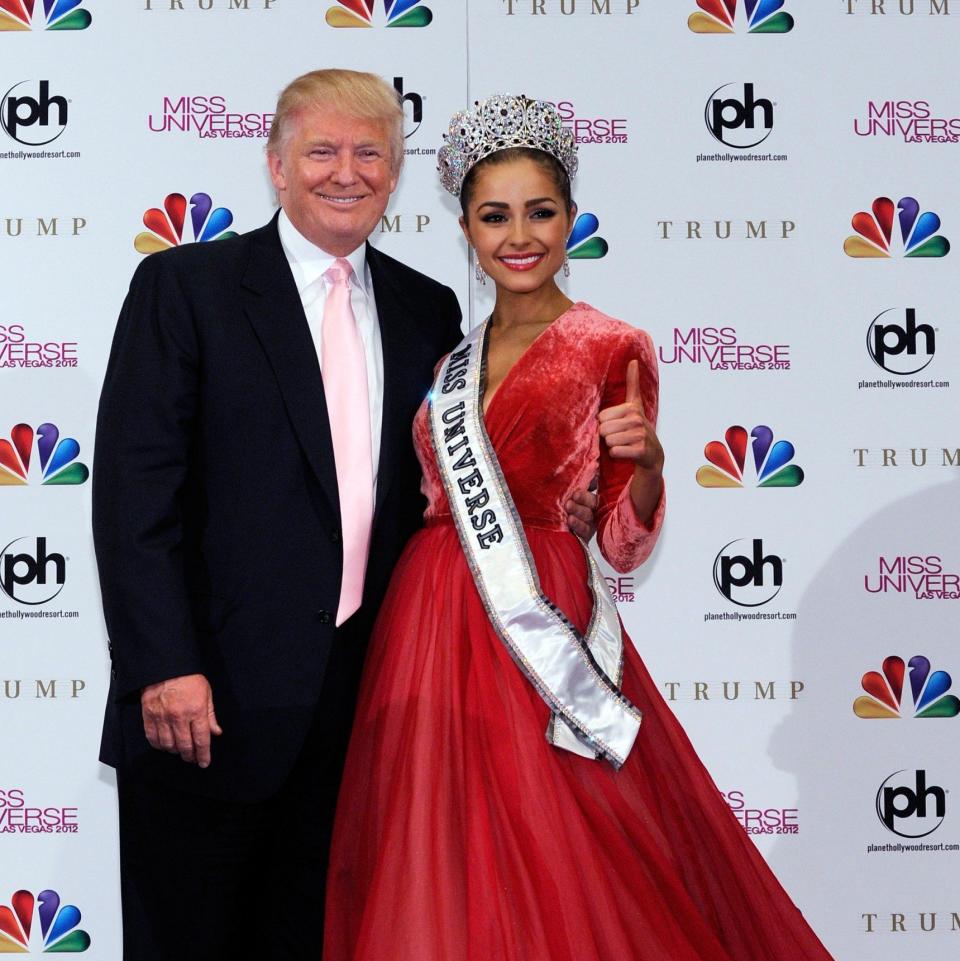
In 1997, during his first year in charge, he shamed Alicia Machado, from Venezuela, for gaining weight during her tenure as Miss Universe. He called her “Miss Piggy” and “Miss Housekeeping”. Trailed by cameras, he followed Machado to a gym to watch her exercise. “This is somebody who likes to eat,” he told reporters, in his suit and tie.
Later, a former Miss Arizona, Tasha Dixon, told reporters that Trump entered the Miss USA dressing room in 2001, when she was a contestant. “He just came strolling right in,” Dixon said. “There was no second to put a robe on or any sort of clothing or anything. Some girls were topless. Other girls were naked. Our first introduction to him was when we were at the dress rehearsal and half-naked changing into our bikinis.”
This laissez-faire attitude to closed doors was corroborated by numerous other women. And, as it happens, Trump himself. “You know, no men are anywhere. And I’m allowed to go in because I’m the owner of the pageant. And therefore I’m inspecting it… *Is everyone OK?* You know, they’re standing there with no clothes. And you see these incredible-looking women. And so I sort of get away with things like that,” he told Howard Stern in 2005.
As is usually the case, Trump got away with it. In 2015, he sold Miss Universe to IMG. Last year, IMG in turn sold it to Anne Jakkaphong Jakrajutatip, a 44-year-old Thai billionaire and, notably, transgender woman. In her maiden onstage speech as owner, she proclaimed Miss Universe would now be ““run by women, owned by a trans woman, for all women around the world to celebrate the power of feminism!”
Trump probably didn’t intend for that to be part of his legacy, but alas. Lately, commentators have highlighted his change in stance since 2012 as evidence of his tendency to flip-flop on major issues. But representing Jenna Talackova all those years ago, it was Gloria Allred who changed his mind.
“I said something to the effect of: ‘Mr Trump, we don’t care what your anatomy looked like when you were born, and you shouldn’t care what her anatomy looked like when she was born.’ Well, obviously, that really upset him,” she recalled of their 2012 confrontation.
At the time, Trump retorted with, “Oh, Gloria would probably love to see what’s under my pants.” Allred fired back that she didn’t have a magnifying glass that strong. “Mr Trump,” she continued to a reporter, “you have to understand, the world does not revolve around your penis, or anyone else’s penis. If it ever did, it doesn’t any more. This is not about genitals. This is about discrimination.”
But for so many, not least Republican voters in 2023, it is still about genitals. “Let’s see what happens,” as he said in his video in Trump Tower. On the campaign trail, he may well live to regret it.

